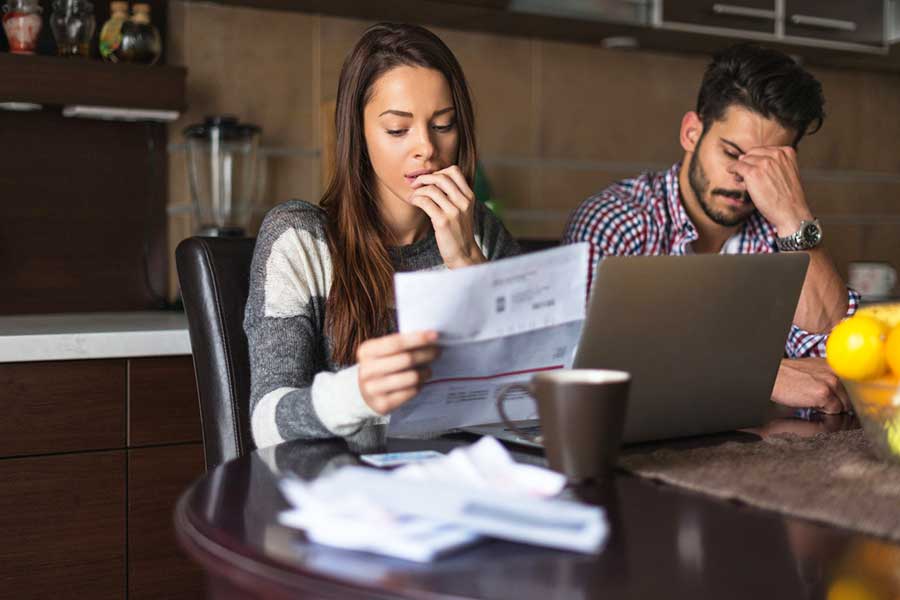A single bounced check can cost you more than just embarrassment—it can trigger bank fees, overdraft charges, and even harm your credit health.

This article explains what a returned check fee is, how much it usually costs, why it happens, and the steps you can take to avoid it.
By the end, you’ll know exactly what to expect and how to keep your bank account safe from these expensive fees.
What Is a Returned Check Fee?
A returned check fee is the charge a bank imposes when it can’t process a check you wrote or deposited. That usually happens because there weren’t enough funds in the account or for some other technical reason.
You might see this called a bounced check, NSF check (short for “non-sufficient funds”), or dishonored check.
In most cases, banks charge between $25 and $40 for a returned check, though the exact amount depends on your bank and account terms.
How Returned Check Fees Work
Here’s how things typically unfold when a returned check fee hits:
- You write a check or authorize a payment.
- The person or business you paid tries to cash or deposit it.
- Your bank looks at your account balance and sees there aren’t enough funds, or there’s another issue (like a stop payment or account closure).
- The bank rejects the check, and you get hit with a returned check fee.
- In some cases, the recipient’s bank may also charge a fee—or delay or reverse the deposit.
Example scenario:
Imagine you wrote a check for rent. When the landlord deposits it, your account didn’t have enough money. The bank refuses to honor the check and charges you a returned check fee. Meanwhile, your landlord’s bank reverses the deposit, and your landlord now has to follow up with you for payment again.
Common Reasons Checks Get Returned
Here are some of the most frequent causes:
- Insufficient funds: Your account balance was too low.
- Closed account: The account you used is no longer open.
- Incorrect or incomplete information on the check: For example, wrong date, missing signature, or mismatched numbers and words.
- Stop payment request: You asked your bank to stop that check before it was cashed.
- Fraud suspicion: The bank flagged the check because it looks unusual or possibly fraudulent.
How Much Do Banks Charge for Returned Checks?
The cost of a returned check can vary depending on your financial institution. While many banks still charge between $25 and $40 per incident, some now charge less or have eliminated these fees entirely. A few also cap the number of fees per day or may offer a one-time courtesy refund if you ask.
Here’s a breakdown of what major banks and credit unions charge today:
| Bank / Credit Union | Returned Check Fee / NSF Fee | Overdraft Protection Option | Notes |
|---|---|---|---|
| Bank of America | $35 | Yes | Can link savings to avoid |
| Capital One | $9 | Yes | Lower than average |
| Chase | $34 | Yes | Capped at 3 fees per day |
| Citibank | Around $29 | Yes | Not always published clearly; often charged when checks are stopped or returned |
| Navy Federal Credit Union | $29 | Yes | Fee applies at first presentment of check or ACH item |
| PNC Bank | No NSF fee (consumer accounts) | Yes | Eliminated returned item fees for personal checking accounts |
| TD Bank | Varies | Yes | Policies focus on posting order and overdraft coverage |
| US Bank | $16 (business accounts) | Yes | Applies mainly to business accounts; other fees may apply |
| Wells Fargo | $35 | Yes | May waive for first occurrence |
This comparison shows just how different fee policies can be. Some banks, like Capital One and PNC, keep fees low or even eliminate them, while others still charge $30 or more. Knowing your bank’s approach can help you avoid surprises when managing your account.
Returned Check Fees vs. NSF Fees vs. Overdraft Fees
These terms are often confused, but they mean different things. Here’s a breakdown:
- Returned check fee: Charged when a check you wrote or deposited can’t be processed.
- NSF fee: Short for “non-sufficient funds,” often used interchangeably with returned check fee, but sometimes applies to other rejected payments.
- Overdraft fee: Charged when the bank allows a transaction to go through even though your balance is negative.
Comparison table:
| Fee Type | When It Happens | Who Gets Charged | Typical Cost |
|---|---|---|---|
| Returned Check Fee | A check is rejected by the bank | Person who wrote the check | $25–$40 |
| NSF Fee | Payment is denied due to insufficient funds | Account holder | $25–$40 |
| Overdraft Fee | Bank covers payment, balance goes negative | Account holder | $30–$35 |
See also: Overdraft Fees vs. NSF Fees: Which Hurts Your Wallet More?
Can a Returned Check Affect Your Credit?
Banks don’t report returned checks directly to the credit bureaus. However, if the unpaid amount is sent to collections, it can show up on your credit report and hurt your credit score.
Returned rent checks, loan payments, or utility payments may also cause issues with landlords, lenders, or service providers—even if the incident never appears on your credit report.
What Happens If You Deposit Someone Else’s Returned Check?
Depositing a check that later gets returned can create problems for you as well. Banks may charge the depositor a returned item fee when a check bounces. On top of that, the money you thought you received will be pulled back out of your account, which could cause your own balance to go negative.
Other possible outcomes include delays in receiving funds and a temporary hold on your account if the bank suspects repeated returned checks. This is why it’s always worth confirming that the person or business writing the check has sufficient funds before relying on it for important expenses.
How to Avoid Returned Check Fees
The good news is that most returned check fees are preventable with a few simple habits. Here are some of the most effective ways to avoid them:
- Monitor balances regularly: Check your account often to make sure you have enough money to cover any checks you’ve written.
- Set up overdraft protection: Link a savings account or line of credit so the bank can cover checks even if your checking account is short.
- Use electronic payments: Bill pay, debit card payments, and ACH transfers are faster and more reliable than paper checks.
- Deposit checks promptly: Holding on to a check for too long increases the chance of issues with the payer’s account.
- Keep a buffer in your account: Maintaining a small cushion helps protect against timing issues with deposits and withdrawals.
What to Do If You’re Charged a Returned Check Fee
If you do get hit with a returned check fee, you still have options. Here are the steps worth taking:
- Contact your bank: Ask for a one-time courtesy refund. Many banks are willing to reverse the fee if it’s your first offense.
- Make good on the payment quickly: Pay the person or business another way so the situation doesn’t escalate.
- Ask about overdraft protection: Linking accounts or signing up for coverage can help you avoid future fees.
Final Thoughts
Returned check fees can be frustrating, but they’re also a clear signal to keep a closer eye on your accounts. With most banks charging between $25 and $40 per incident, one mistake can add up quickly.
The best way to protect yourself is by keeping your balance healthy, using electronic payments whenever possible, and asking about fee forgiveness if you slip up.
If you find bank fees piling up, it may be time to look into second chance checking accounts or low-fee banks that are better aligned with your financial needs.



